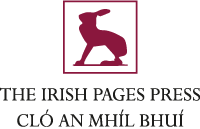The Anthropocene (Volume 11, No 1)
The Editors of Irish Pages – Chris Agee, Cathal Ó Searcaigh, Kathleen Jamie and Meg Bateman – have been assembling a new issue of the journal, provisionally entitled “The Anthropocene”. It will appear in early 2020 and aims to evoke the escalating global ecological crisis in the round, through many of its key components: climate change, deforestation and bogland destruction, oceanic warming and sea-rise, the melting of glaciers and the Arctic, extinctions, die-back of insects (including bees) and amphibians, the meat and methane issue, soil and land-use, plastic pollution (including micro-plastics) and the waste crisis, the eco-vandalism of sea-mining, roads and dams, the extermination of indigenous peoples and languages, biodiversity and ecocide generally, and so on – and on.
A certain amount of poetry and prose will also deal with humanity and human consciousness more generally, in their historical, cultural, psychological, artistic and religious dimensions. As with other issues, however, there will also be work included that does not bear explicitly on the theme of the issue.
Areas of Particular Interest:
- Bees and insects
- Amphibians
- Birds
- Extinctions
- Biodiversity and ecocide
- The seas and coasts
- Rainforests, temperate forests, deforestation and re-forestation
- Arctic and Antarctic
- Coral reefs
- Irish bogs, flora and fauna
- Climate change
- Waste and trash
- GM and biotechnology
- New technologies and AI
- Nuclear power and weapons
- Digging and soil destruction
- Over-development and over-population
- The ecological damage of wars
- Cities
- Civilizational futures
- Human consciousness and the arts
Love (Volume 11, No 2)
The Editors have also begun work on this issue. Work in any genre and any style will be welcome on this vast and complex theme. The OED lists several dozen senses of the word for both the noun and the verb. There are many more compound uses and modern sexual variations and overtones. The Greeks first formulated a typology of eight types of love. And so on. No further elaboration is needed.


